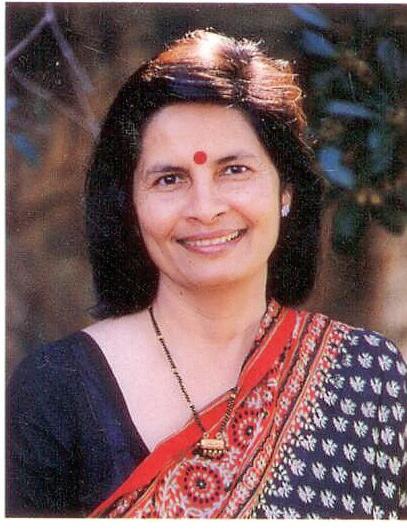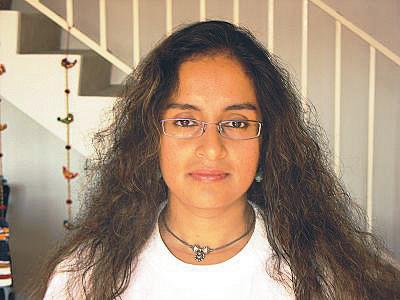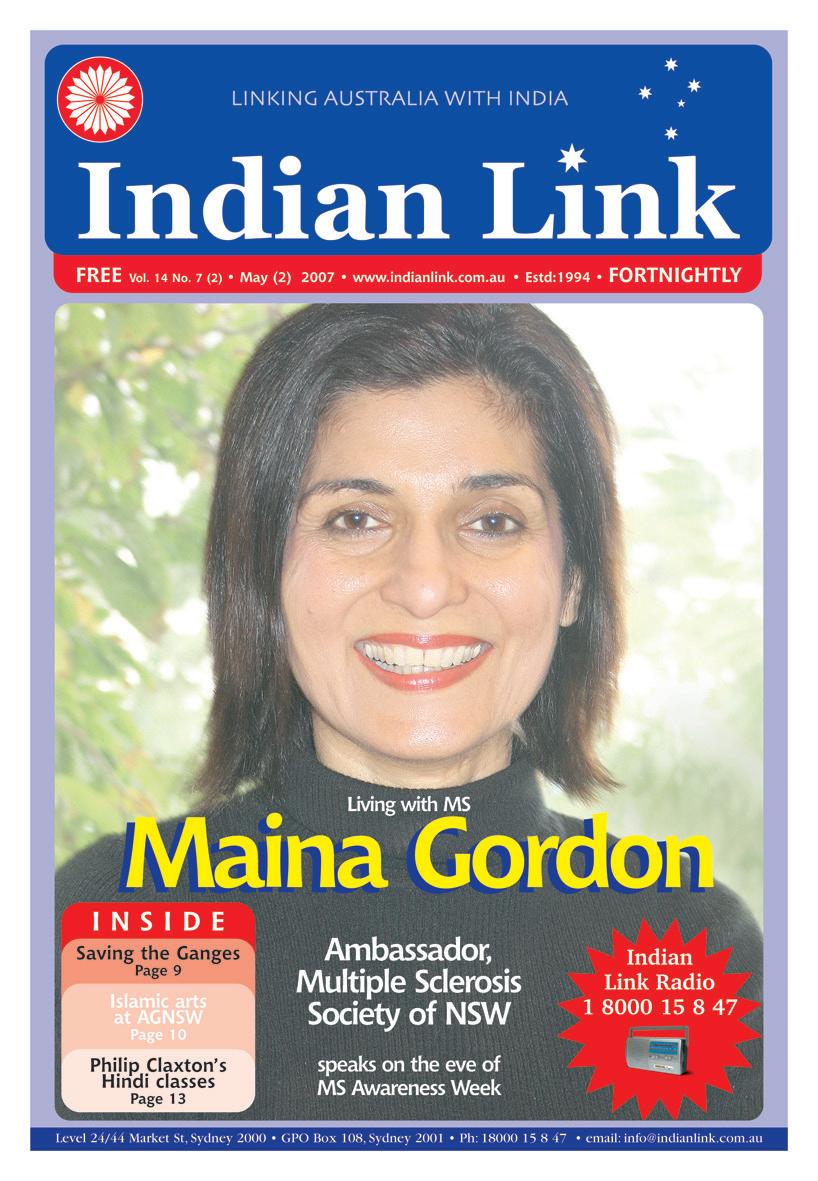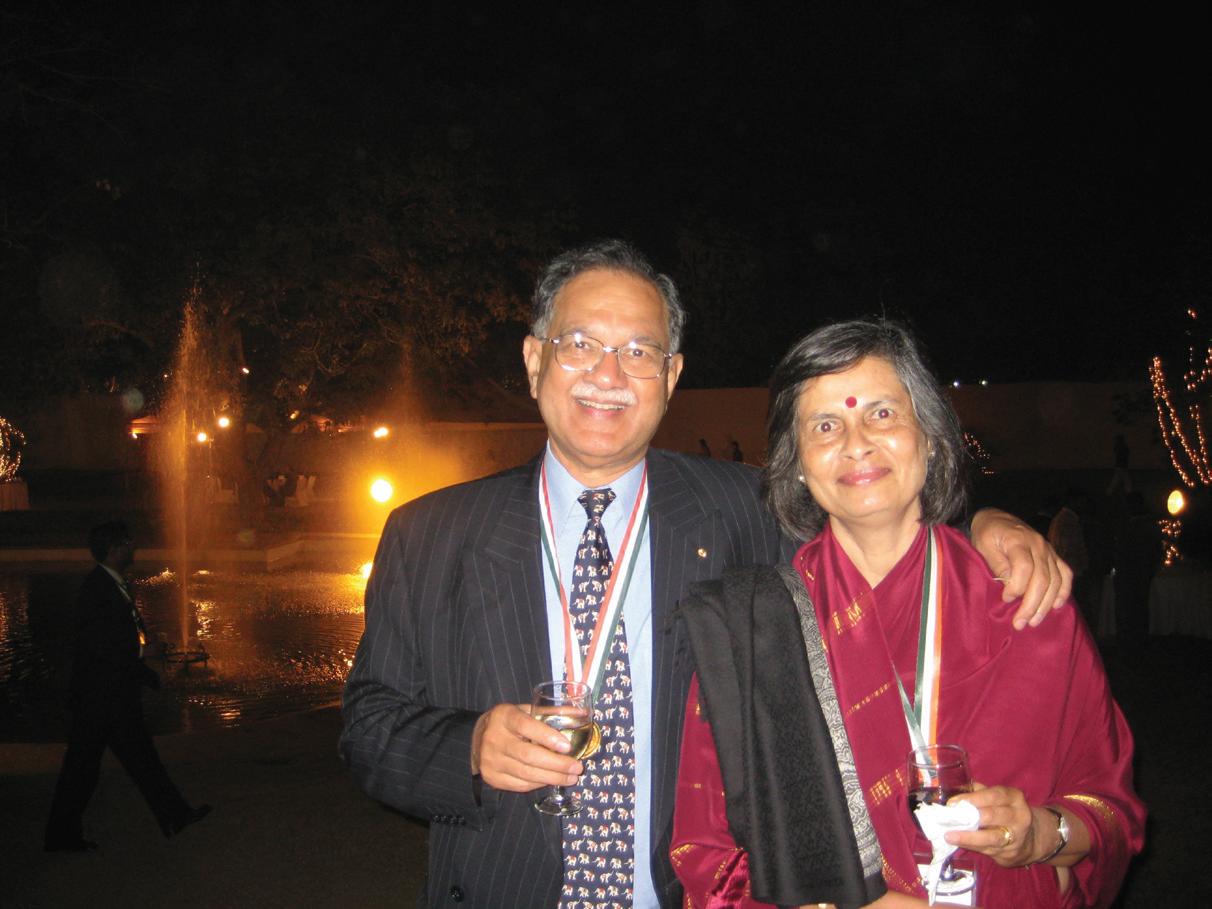
8 minute read
Braveheart
from 2009-09 Sydney (2)
by Indian Link
Mother, socialite, lifecoach. It’s definitely for Gladys Roach, femme extraordinaire, who has emerged from a dual battle with the Big C, says
SHERYL DIXIT
Gladys Roach is an extraordinary woman, although she certainly doesn’t think so. No matter what challenges life has offered her, she has met them with a strength, resilience and aplomb, which is completely her own. She has weathered storms and squalls, but in the end, she has always come back out to sit in the sun, complete with sunscreen, hat and a good book. Gladys had an intense battle with breast cancer, finally emerging the winner through tough times which often threatened to overwhelm her, and this is her story.
Gladys arrived in Adelaide in ’65 as a young Mangalorean bride to join Neville, the love of her life whom she had been dating since they were sixteen. An endearing love story indeed, which continues to this day. “I spent my time looking for people,” she quips, as in those days Adelaide was a mere shell of its robust modern-day presence. “Those were the days when Indian migrants were few and far between, and the only spice available was a ‘curry’ powder, that had been imported from England,” she recalls. Times were tough for the young couple, and Gladys was exposed to a raft of new experiences. The eldest daughter of an indulgent father, she was unfamiliar with the mysteries of cuisine, and taught herself to cook; indeed so well, that she went on to author several cookery books later in life, and also worked in the food industry in the role of a consultant.

Adelaide is where Gladys began her journey in Australia as a young migrant with a sadly limited wardrobe. When Gladys arrived from India, her wardrobe was limited to mainly saris, which she had worn back home, and even in Spain, where she had spent two years. The Spaniards were fascinated by her attire in its colourful and unusual array, and the Australians were no different. “To them, I was something new and unique,” she recalls. “I never had a problem finding a seat on a crowded bus, someone always got up to offer me their seat. I think it was the sari,” she says. Gladys admits that Neville and she were very lucky, because all the Aussies they came in contact with during those teething years, were very friendly and kind to them. “They didn’t see us as any different from themselves,” she says. “They welcomed us with open arms and we have happy memories of those days.” A move to Melbourne followed as Neville changed his job, and they subsequently moved to Sydney with their three children. Life was happy, fulfilling and had no more than the usual complications.
But one day, seven years ago, Gladys sat looking at a letter from the government, offering free mammograms for women above the age of 60. She had the last one done two years ago, and it was now time for another test. Rather than put it off again, Gladys decided to do the test at the North Shore hospital in which her son worked as a doctor, giving her the chance to meet up with him as well. She waited at reception for the tests results to arrive, assuming that the wait was a normal one, endured by all patients who had done tests. But when a couple of doctors asked to see her again and put her through a more rigorous examination, Gladys began to suspect that all was not well. The doctors didn’t mince words; they had found a growth which would need a biopsy. It was close to the breastbone and would not have been located if it wasn’t for the mammogram. Gladys walked out of the room with a feeling of numbing shock, with no thought other than to seek out her son. When she found him, “I cried all over him,” she admits with a laugh. The next couple of weeks were anxious, with a series of tests and a lumpectomy conducted, and Gladys did 39 sessions of radiography. She was fortunate that her condition didn’t need chemotherapy, a small relief in the wider spectrum of the ordeal. Fortunately for her, the cancer was contained thanks to the treatment, and after a gruelling experience, she was on the road to recovery.
For Gladys, after the initial shock of discovering that she had breast cancer, her very next reaction wasn’t panic or fear, but a practical and matter-of-fact assessment of her situation and how best she could deal with it. “I knew I had to get on with it,” she says. “A lot of people feel the dread of the ‘C’ word which is unfortunately, instantly associated with death, but I knew that wasn’t going to happen to me.” Her strength of character and her independent personality helped her take the crisis in her stride. “I have always made my own decisions, and I decided that I would do what I had to do. My condition was not private, people knew I had breast cancer. But although I had all the support I could ever want, what I did not want was to be dependent, and I certainly didn’t want people making a fuss over me,” she says vehemently. “Even my family and friends knew this, and were always around if I ever felt the need for support. But this was my battle, and I was going to fight it my way.” Of course, despair did creep in at times, but it was more the feeling of being fed-up with the seemingly endless treatment or feeling that she had no control over what was happening. People’s reactions were varied and unusual. “Everyone was supportive, but a few people actually addressed me in hushed, sepulchral tones, which I initially found annoying, but later, amusing. They probably thought I was on death’s door!” she reveals. “It’s human nature to say that they know what you’re going through, but the reality is that no-one really knows, except yourself. People mean well, but in the end, you are the one with the condition and you are going through each phase. You have to keep strong.” This inner strength came to the aid of Gladys a couple of years ago, when her youngest daughter was diagnosed with a particularly aggressive form of breast cancer. As she confides, “My cancer was nothing, compared to what Saritha had to go through.” Her daughter had to have a mastectomy, and as the cancer had spread to her lymph nodes, she had to undergo treatment through radiology, chemotherapy and drugs. To add to her ordeal, she had all the textbook reactions to everything. Saritha’s journey was harrowing, and having a young daughter to care for as well, made the fight harder, but it also made her stronger. Once again, the support system that surrounded her helped incredibly, and whenever Saritha reached out to family and friends, they were always there for her. The form of breast cancer that Saritha had was not genetic, nor was it hormone based, and wasn’t the same as her mother’s. Breast cancer is not genetic, although people from the same family are at higher risk of having a mutated gene. “Saritha is now getting better, and what reassures me the most is that she is starting to rediscover her creativity,” says a visibly proud Gladys.
“She has always been a generous and affectionate person with a rare sensitivity, and we are seeing increasing signs of these traits once again, a sure sign that she’s over the worst. Everyone rallied around her when she needed them, and we will all continue to be there for her whenever she needs us.”
Gladys feels that in her case, dealing with trauma was probably a bit easier, as she had witnessed the struggle of a cousin and a dear friend through cancer. Additionally, her training as a Bereavement and Loss Counsellor helped her through this time. She also trained and worked in Relationship Counselling, and still offers her services in both functions on a voluntary basis. Gladys currently works as a Cross-cultural Training Consultant, helping employees in Australian companies who are being sent to India, to assimilate to the culture and understand it better; and vice-versa. Training and experience in counselling helped Gladys to look introspectively at herself, her attitudes and her life, and she believes that this made her a better human being.
For people who’re going through a battle with cancer or any other serious illness, Gladys has a strong message: “It’s very important to get as much support as you can, from the family, friends and also the system. The Oncology and Radiology departments are trained in dealing with practical and emotional support, so all you have to do is ask. And people are always willing to lend a hand, if you need one.” Gladys feels that some illnesses aren’t as rare as we think they may be, and it’s surprising how many people suffer from the same condition. The feeling that you are not alone can be very comforting, which is why networking is important. “But in the end, everyone has to deal with their condition in a way that works for them. I know that back in India, knowing that a loved one has cancer can send waves of panic through the family and community, regardless of whether its been detected early or is in an advanced stage. Dealing with that sense of panic is hard enough,” she says. There is an underlying sense of gratitude for the way things have panned out in Gladys’ life. Her matter-of-fact and practical approach has strengthened not just her, but also those around her. All her grandchildren know more about breast cancer than the average child, and they have taken Saritha’s illness too, in their stride. At no point of time were they shielded from the facts, and this has helped them develop a better understanding of the disease and its sufferers. And with Gladys, well, así es la vida, c’est la vie, that’s life! She continues to exude a quiet confidence, an indomitable spirit and a strong sense of compassion, just as she has always done. From a young girl hobnobbing with the likes of Grace Kelly and Audrey Hepburn in sunny Spain, to a mature and more placid lifestyle now on Australia’s shores, Gladys has come a long way. And as she has done all her life, she makes the most of every moment.
We featured her as our cover girl in the May-2, 2007 issue of Indian Link It was Multiple Sclerosis Awareness month, and Maina Gordon spoke to us about the condition in her capacity as MS Ambassador for the state of NSW. (Most MS Ambassadors serve one twoyear term. Maina has served two 2-year terms.) Maina, a Sydney-based Solicitor, was diagnosed with MS about 17 years ago. She has spent much time talking to lay people, sufferers and support groups about the condition and helping raise not just awareness but also thousands of dollars for research on MS.

A few months ago, Maina was diagnosed with breast cancer, and has just returned home after another stint in hospital.
Maina is one of the bravest people I know.
Life has dealt her a shocking pack of cards, healthwise but you would never know that, as she is always positive and never mopes about.
She gets on with things, practices law, dotes on her girls, tolerates her golf-mad husband, and despite her severe handicap, tries to lead as full and normal a life as possible.
To top it off, she can swear like a trooper and can certainly hold her own amongst the boys.
As we go to press, she is planning the 50th birthday party of her husband Neil –it promises to be a boisterous affair.
Maina Gordon is truly inspirational and deserves nothing but our very best wishes and prayers.
Darshak Mehta

Clockwise from extreme left:










